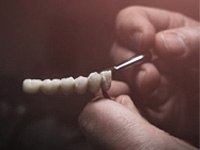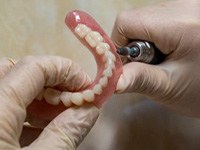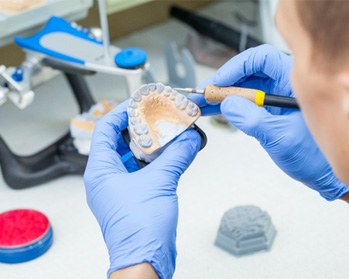Why Choose Family Dental Center of East Texas for Dentures?
- Custom, High-Quality Prosthetics for Optimal Aesthetics
- Talented and Knowledgeable Staff
- Replace All Missing Teeth at Once
Who’s a Good Candidate for Dentures?
If you have experienced significant tooth loss, dentures could be just the solution for you. Patients missing all of their teeth could benefit from full dentures, while someone with only a few pearly whites gone might be a good candidate for partial dentures. Ultimately, it’s best to consult with your dentist in Center to decide the best option for you. Keep reading to learn what can make you eligible for this restorative treatment as well as alternative options to consider for renewing your missing teeth.
Read More
Effects of Missing Teeth
According to the American College of Prosthodontists, the most common reasons that tooth loss occurs include issues like decay, periodontal disease, and accidental injuries. Unfortunately, if left unaddressed for too long, having missing teeth can lead to a variety of negative impacts over time, including:
- Difficulty eating – Being unable to effectively chew your food, especially tougher ones, can make you more likely to miss out on essential nutrients and minerals, which can increase the risk of malnutrition and indigestion.
- Trouble speaking – Without most of your pearly whites, it can be difficult for you to pronounce and enunciate words when conversing with others.
- Facial sagging – Due to a lack of stimulation of blood flow into your jawbone, missing your teeth can leave your facial muscles unsupported. This can lead to you having a more aged or sunken appearance.
- Reduced self-esteem – Having gaps in your smile can have a negative effect on your self-confidence and overall quality of life. This can also impact your social and professional interactions.
What Qualifies You for Dentures?
Nearly every adult who’s struggling with severe tooth loss, damaged teeth, or gum/bone tissue loss can be a good candidate for dentures in Center. While this treatment is a versatile and reliable solution for most patients, you’ll need to have healthy gums and a strong jawbone to ensure the restoration is successful. Additionally, it’s best if you’re committed to practicing good oral hygiene every day as well as visiting your dentist for routine checkups and cleanings.
Alternative Tooth-Replacement Options
If you aren’t eligible for dentures, it doesn’t mean you’ll be out of tooth-replacement options. Here are two other effective solutions for renewing your full smile:
- Dental bridges – These restorations are typically reserved for patients who are missing one or several consecutive teeth. A dental bridge closes the gaps in your teeth by having the crowns anchored to nearby healthy teeth with the pontics (artificial teeth) connecting them.
- Dental implants – These titanium posts will be embedded into your jawbone, allowing your new crown, bridge, or dentures to be directly anchored to your facial structure. For this procedure to work, you’ll need to have healthy gums and sufficient jawbone density to support the implants. This option does come at a higher upfront cost, but the results are long-lasting.
Learn More About Dental Bridges
Learn More About Dental Implants
What Are Dentures?
There are two types of dentures: full and partial. When you think of dentures, your mind probably conjures up an image of full dentures, which consist of an entire set of artificial teeth attached to a gum-colored acrylic base. They stay in place through natural suction as well as denture adhesive if necessary. Full dentures are typically removable and should be placed in a glass of water or denture cleanser when not wearing them at night. This will also give your gum tissue a chance to rest and recover.
Partial dentures, on the other hand, are used when a patient is missing certain teeth, but healthy ones remain. This prosthetic consists of some artificial teeth and is held in place with the help of clasps and/or brackets. Like full dentures, partials are designed to be removable.
How Dentures Are Made
If dentures are in your near future, you may be wondering how the process works and how they are made. Understanding the creation of dentures will help you appreciate your replacement teeth that much more! Here is how the magic usually happens.
Read More
What Are Dentures Made Of?

Dentures are made up of two different parts: the base of the denture and the replacement teeth. Here’s what each one consists of:
-
Denture Base:
This is the structure that gives the replacement teeth support. It can be made from many different materials, like acrylic, nylon, porcelain, resin, and metal. Full dentures are usually made from acrylic because they can be tailored to match your natural gum tissue. Partial dentures may use metal clips with an acrylic base.
-
Artificial Teeth:
The replacement teeth are often made from resin or porcelain because they both have an appearance that resembles natural teeth. However, porcelain is generally the preferred option because it is durable and feels like a natural tooth. Because porcelain can be abrasive on adjacent teeth, it is typically only recommended for full dentures.
The Denture Creation Process

Because every denture is custom-made for the patient’s mouth, it requires a multi-step process. Here is what this usually looks like:
-
Step 1:
The dentist takes an impression of the patient’s upper and lower gums. This is used to create a plaster model that is a replica of the mouth. This is used to ensure that the final denture is the perfect size and shape. Measurements of the jaw are also taken at this time.
-
Step 2:
The cast is sent to the dental laboratory where the dentures are crafted. At this time, a wax version of the gumline is created.
-
Step 3:
Artificial teeth are set in place. A mechanical device called an “articulator” is used to attach the teeth with wax. Then, the lab technician makes minor adjustments to ensure that it closely matches your gums. The wax base is used for your finished denture.
-
Step 4:
The wax dentures are sent to the dental office for a fitting. After being approved by the patient and dentist, the dentures are sent back to the lab to complete the process.
-
Step 5:
Once returned to the lab, the dentures are boiled to melt away the wax portions. To do this, the dentures are placed in a holding device and plaster is poured to maintain the shape of them. The entire flask is placed in the hot water to melt the dentures.
-
Step 6:
Holes are made in the teeth so the material can attach to it. A liquid separator is also added to the plaster layer to keep the acrylic from sticking to it. Acrylic is then injected into the flask to replace the wax.
-
Step 7:
The plaster is carefully removed using special lab tools to reveal the denture. The acrylic dentures are then placed into an ultrasonic bath to remove any remaining plaster.
-
Step 8:
The excess acrylic is trimmed off the denture and then polished to perfection.
-
Step 9:
Once the dentures are ready, they are sent to the dental office and the patient returns for a fitting. If necessary, adjustments can be made to make sure that everything feels and looks great!
Adjusting to Your New Dentures

It can take some time to get used to new dentures. You may experience some minor soreness at first. Some patients also have difficulty speaking and eating at the beginning. However, with time, the mouth will adjust to your replacement teeth. You can speed up this adjustment process by sticking to soft foods and exercising your facial muscles. If you have any concerns regarding your dentures or if discomfort persists, don’t hesitate to reach out so we can help.
Benefits of Dentures
Dentures are a life-changing tooth replacement option for many people who have suffered from extensive tooth loss. This prosthetic is able to restore the appearance and function of one’s smile. Continue reading to learn about some of the incredible benefits that you can experience by opting for dentures.
Read More
Psychological Benefits

If you don’t have any healthy teeth, this can be a challenging fact to accept. Many sufferers of extensive tooth loss experience negative effects on their self-esteem and self-confidence, leading to a higher risk of sadness and depression. By restoring your smile with dentures, you can feel better about your image, reducing anxieties about your appearance, speech articulation, chewing ability, and more!
Clearer Enunciation

Having gaps in your smile can make it more challenging to make certain sounds and say different words. To pronounce and perform your words, your lips and tongue need to be positioned in a specific way. With gaps in your smile, the tongue cannot sit against your teeth, making some words nearly impossible to say.
Improves Nutrition

Lots of nutrient-dense foods that you need to be healthy are tough in texture. This includes healthy proteins, fruits, and vegetables. If you can’t chew your food properly due to tooth loss, this can negatively impact your eating habits, ultimately resulting in indigestion and malnutrition. With dentures, you can chew your food more easily, allowing you to enjoy a more expansive diet.
Preserves Oral Health

If you still have some healthy teeth, dentures can help to keep them in better shape. By filling in the gaps with a partial denture, you can prevent the surrounding teeth from shifting around. Dentures also help to bear some of the weight of routine chewing, limiting the wear and tear of the existing teeth.
Expands Opportunities

Making a good impression is key when you are attending interviews, negotiating sales, and attending social gatherings. Your smile is one of the first things that people notice about you, so having teeth that appear healthy will do nothing but help you. Studies have found that the probability of being employed is negatively associated with poor dental health.
Dentures Aftercare
For patients with multiple missing teeth, dentures can be a reliable and affordable solution, but they need proper care to stay in great condition. At Family Dental Center of East Texas, we help patients enjoy long-lasting, comfortable smiles by teaching the best practices for caring for dentures.
Good aftercare not only protects your restoration but also keeps your gums and mouth healthy. With a few daily habits, you’ll maintain the look, fit, and function of your prosthetics while preventing common issues. Read more below to see exactly how to keep your dentures looking, feeling, and working their best.
Read More
Removeable Dentures

Remove After Eating
Food particles can get trapped under dentures, leading to irritation or infection if they’re not cleaned out. Always remove your dentures after meals and rinse them thoroughly under running water. This helps keep your restoration clean and prevents bacteria buildup. While it may seem like a small task, keeping your dentures fresh will make a great impact on their comfort and effectiveness.
Clean Your Restoration
Besides a quick rinse after meals, your dentures deserve the same attention as natural teeth. Twice a day, use a soft-bristled toothbrush and colorless, scentless liquid soap or denture cleanser to remove plaque and food particles. Avoid using regular toothpaste, which can scratch and damage the surface of your restoration. This step keeps your prosthetic bright, comfortable, and odor-free so you can always smile your best.
Keep Your Dentures Safe
Dentures are durable when used as intended but they’re still vulnerable to drops, scratches, and curious pets or children. When cleaning them, fill the sink with water and place a towel over the counter in case they slip.
Always store your dentures in water or a denture-soaking solution when not in use and never let them dry out. Dentures keep their shape and stay flexible while damp, but if allowed to dry out they can warp, crack, or become otherwise uncomfortable to wear.
Remove When You Sleep
Wearing dentures at night is convenient, but it isn’t good for your health in the long term. Sleeping with your prosthetics can irritate your gums and has been linked to a higher risk of respiratory issues like pneumonia, especially in older adults.
Removing your dentures while you sleep allows your gums and jawbone to rest and overnight soaking keeps them clean and moist, preventing warping. By caring for your dentures in this way, you’ll extend their life and improve your oral health.
Notice Changes
If your dentures start to feel loose, rub against your gums, or cause sore spots, don’t ignore it. These changes may be a sign that your restoration needs an adjustment. Regular checkups at our Center dental office allow us to make corrections and keep your prosthetics fitting comfortably. Caring for dentures includes knowing when to ask for professional help, and your smile deserves nothing less.
Understanding the Cost of Dentures
Dentures are one of the most affordable ways to replace missing teeth! Because every smile is unique, there is no one-size-fits-all cost for this popular restoration. Your dentist will provide you an accurate cost estimate after evaluating your mouth during a consultation. To learn more about the different factors that influence the cost of dentures in Center, keep reading below!
Read More
Should I Have All My Teeth Pulled to Get Dentures?
If you still have teeth remaining in your mouth, we’ll have to consider carefully whether they should be replaced by dentures or not. It’s always better to repair a tooth if possible; extractions are only performed in specific circumstances, such as extensive decay that can’t be fixed, severe infections that cannot be reversed, or gum disease that has already destroyed most of the tissue connecting the tooth to the jaw. When there aren’t enough teeth worth salvaging, they can all be removed to make room for full dentures. We can remove all of your teeth over the course of a single visit, but bear in mind that some extractions may be more complex than others.
Can I Sleep with Dentures?
It is definitely possible to sleep with dentures, and in fact you’ll keep them in your mouth for the first 24 hours after you get them. But after that first night, it will be better for your oral health if you start taking your dentures out when it’s time to go to bed. Between the pressure dentures can put on your gums and the tendency of bacteria to build up in the dark, moist space underneath your false teeth, you’ll want to give your mouth a break at the end of the day while also making sure that you’re keeping it as clean as possible.
Does Getting Dentures Hurt?
You may have some soreness after your teeth are removed to make room for your dentures, but it should improve after 3 to 5 days. You can take pain medication in the meantime. New dentures do have a tendency to irritate the soft tissues in your mouth, but you should be able to adjust after a few months. If the pain is worse than expected or persists for an abnormally long time, then there’s either a problem with your dentures or there’s a more serious oral health issue that needs to be treated, so you’ll need to call us right away.
Can I Eat Steak with Dentures?
Eating steak and other tough meats with dentures can be challenging, but it’s perfectly doable when the right steps are taken. Try to request tenderloin and other easier-to-chew cuts when possible, and make sure that the meat has been tenderized first. When the time comes to eat, cut the meat into smaller pieces that are easy to chew. If you still have trouble, try double-checking the fit of your dentures and consider getting an adhesive to make them more stable.





















